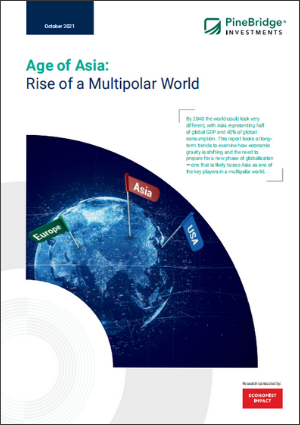Age of Asia: Rise of a Multipolar World
Download WhitepaperFinancial Services
Age of Asia: Rise of a Multipolar World

Based in Hong Kong, Jason covers Asia from Australia to India. His background includes managing publications, financial reporting and technical marketing as well as a decade of product-sourcing experience with mainland China factories. Some of his most formative work, however, has been as a stay-at-home dad and freelance writer, covering topics from perfluorocarbons to popcorn. Jason received a BA in English from the University of Massachusetts, Amherst with study at the University of Sheffield in Yorkshire, UK.
Related content

The shifting landscape of global wealth: Future-proofing prosperity in a ti...
In some instances the impact of this shift will be shaped by local factors, such as demographic changes. In other instances this shift will reflect shared characteristics, as demonstrated by the greater popularity of overseas investing among younger high-net-worth individuals (HNWIs) brought up in an era of globalisation. Whatever the drivers, the landscape of wealth is changing—from local to global, and from one focused on returns to one founded on personal values.
Despite rising economic concerns and a tradition of investor home bias in large parts of the world, the new landscape of wealth appears less interested in borders. According to a survey commissioned by RBC Wealth Management and conducted by The Economist Intelligence Unit (EIU), younger HNWIs are substantially more enthusiastic about foreign investing. The U.S. is a particularly high-profile example of a country where a long-standing preference for investments in local markets appears set to be transformed.
Click the thumbnail below to download the global executive summary.
Read additional articles from The EIU with detail on the shifting landscape of global wealth in Asia, Canada, the U.S. and UK on RBC's website.

Fintech in ASEAN
To better understand the opportunities and challenges in developing a fintech business in seven ASEAN markets, The Economist Intelligence Unit conducted wide-ranging desk research supplemented by seven in-depth interviews with executives in Australia and ASEAN.
Download report and watch video interview to learn more.

Risks and opportunities in a changing world
Read our Taxing digital services, U.S. tax reform: The global dimension, & Planning for life after NAFTA articles by clicking the thumbnails below.


